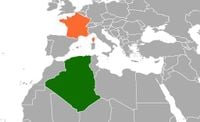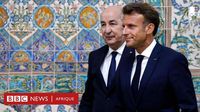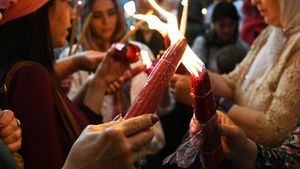Algeria and France are escalating diplomatic tensions following the controversial kidnapping of Algerian influencer Amir Boukhors, also known as Amir DZ. This incident has reignited historical grievances between the two nations, reflecting a complex backdrop of colonial history and contemporary political strife.
On April 15, 2025, France expelled twelve Algerian diplomatic officials, a move that came just a day after Algeria announced the expulsion of an equal number of French officials. This diplomatic tit-for-tat arose after three Algerians, including an employee of the Algerian consulate in France, were implicated in Boukhors' kidnapping in a Paris suburb in April 2024. The French public prosecutor's office has opened criminal proceedings against these individuals, intensifying the already fraught relations.
The relationship between Algeria and France has been rocky for decades, with tensions flaring up particularly around issues of colonialism and national identity. In the summer of 2022, a brief thaw occurred when French President Emmanuel Macron visited Algeria and characterized France's colonial rule as a "crime against humanity." This statement was seen as a significant acknowledgment of historical wrongs, but the goodwill was short-lived.
Relations soured again in the summer of 2024 when France sided with Morocco in the Western Sahara conflict, a move that Algeria perceived as a betrayal. Morocco has claimed control over Western Sahara since its annexation in 1975, while Algeria has historically supported the pro-independence Polisario Front. In response to France's position, Algeria withdrew its ambassador, signaling deep discontent.
Amir Boukhors, a vocal critic of the Algerian regime under President Abdelmadjid Tebboune, has been living in France since 2016, where he was granted political asylum in 2023. Boukhors gained notoriety on social media, amassing over 1.1 million followers on TikTok, where he has been critical of Algeria's government. He faced multiple convictions in absentia in Algeria for alleged fraud and defamation, and the Algerian government had previously attempted to extradite him, but French courts rejected these requests.
In late April 2024, Boukhors was reportedly kidnapped in France but was released the following day. Allegations arose that the Algerian government was behind the kidnapping, a claim that Algeria vehemently denied, labeling it an "intolerable intrigue." The Foreign Ministry's response underlined the sensitivity of the situation, as Boukhors' influence extends into Algeria through social media.
Adding to the tensions is the case of Boualem Sansal, a Franco-Algerian novelist and critic of both Islamism and the Algerian government. Sansal was arrested in Algeria in November 2024 and sentenced to five years in prison in March 2025 for remarks deemed to undermine national security. His arrest has sparked outrage in France, with many calling for his release. President Macron has publicly criticized Sansal's imprisonment, further complicating Franco-Algerian relations.
The current diplomatic crisis has been described as unprecedented since Algeria gained independence from France in 1962. Observers noted that the situation escalated after French Interior Minister Bruno Retailleau became involved, particularly following a knife attack in Mulhouse that he attributed to Algeria's failure to comply with legal obligations regarding dangerous individuals.
As the diplomatic spat continued, French Foreign Minister Jean-Noël Barrot expressed frustration, stating that "the Algerian authorities have chosen escalation." Conversely, Algerian Minister Sofiane Chaib accused France of creating a "fabricated" crisis, asserting that relations were improving prior to the recent incidents.
In light of these developments, the French government has reiterated its commitment to dialogue. Barrot emphasized that for the sake of the French people, constructive communication with Algeria is essential. However, the path forward remains fraught with challenges, as both sides grapple with deep-seated historical grievances and contemporary political realities.
This diplomatic clash not only highlights the fragile nature of Franco-Algerian relations but also reflects broader issues of national identity, colonial legacy, and the role of social media in contemporary political discourse. As both nations navigate this tumultuous period, the stakes are high, and the potential for further escalation looms large.





